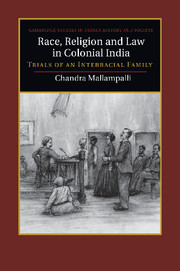Book contents
4 - Letters from Cambridge
Published online by Cambridge University Press: 05 December 2011
Summary
All I ask is that as he [Matthew Abraham] esteemed me worthy of his confidence, and entrusted all and everything to me and to my management hardly withholding a single thought, in like manner you will now (that it has pleased Almighty God to remove him) look to me for the realization of all those plans and hopes which you may have entertained, and I pledge myself never to be behind hand with my efforts to serve you.
Francis to Charles Henry, August 21, 1844
An extraordinary aspect of the Abrahams’ story is the manner in which their business dealings and life experiences straddled diverse worlds. As an instance of connected history, their story not only illustrates links between members of different races and faiths, but also between familial, socioeconomic, and political aspects of human experience. The preceding chapter described the family’s financial and legal entanglement in a predominantly Muslim domain. This chapter describes how life circumstances in India and Britain can shape class consciousness, self-awareness, and notions of identity. It does so by highlighting the relationship between Francis, facing a crisis of trust and legitimacy at home, and Charles Henry, attempting to succeed as a “half-caste” student of law in England.
We can know something about their relationship only because many of their letters were submitted in court as evidence. Years after the last letter passed between them, legal counsel would look for language that revealed the nature of Francis’s role in the family: Did Charles regard him as the natural successor of his father by way of their undivided relationship, or as someone who labored for the family at the behest of his mother? Whereas this was the question that most concerned the courts, it was one among many issues their letters brought to light. Their exchanges, although unstructured at the time by legal proceedings, were shaped by tensions mounting in Bellary. To some extent, these tensions produced a prelitigation discourse, one that did not arise in court but occurred in anticipation of a lawsuit.
- Type
- Chapter
- Information
- Race, Religion and Law in Colonial IndiaTrials of an Interracial Family, pp. 100 - 128Publisher: Cambridge University PressPrint publication year: 2011



